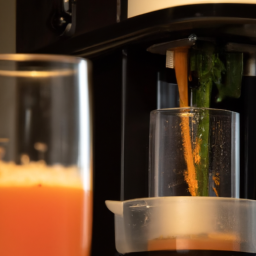Juice Tips and Tricks
How To Make Dragon Fruit Juice

I absolutely love dragon fruit juice – it’s refreshing, delicious, and packed with health benefits! In this article, I will walk you through the steps of making your own dragon fruit juice at home.
First, we’ll talk about the benefits of dragon fruit and how to choose the right fruit at the store. Then, we’ll go through the steps of preparing and blending the fruit, including how to strain the juice and add sweeteners if desired.
Dragon fruit is an excellent source of vitamins, antioxidants, and fiber. It’s also low in calories and has been shown to help regulate blood sugar levels. Plus, it’s just plain tasty!
But choosing the right dragon fruit at the store can be a bit tricky, so I’ll give you some tips on what to look for. Once you have your fruit, we’ll get started on making the juice. Trust me, it’s easier than you think!
So let’s get started and make some delicious dragon fruit juice together.
Key Takeaways
- Choose the right dragon fruit variety at the store.
- Wash, peel, and cut the fruit into small pieces before blending and straining it.
- Use natural sweeteners like honey or agave instead of artificial sweeteners.
- Store the dragon fruit juice in an airtight container in the refrigerator or frozen as cubes to extend its shelf life.
Benefits of Dragon Fruit
You’re going to love the benefits of dragon fruit – it’s packed with antioxidants, fiber, and vitamins that nourish your body and boost your overall health! The nutritional value of dragon fruit is impressive, as it contains multiple essential nutrients.
Dragon fruit is a great source of vitamin C, which helps boost your immune system. It’s also rich in fiber, which aids in digestion and helps regulate blood sugar levels.
In addition, dragon fruit is low in calories and high in antioxidants, which can help reduce the risk of chronic diseases such as heart disease and cancer. The health benefits of dragon fruit are numerous, and incorporating it into your diet can help improve your overall health and well-being.
Now, let’s move on to choosing the right dragon fruit.
Choosing the Right Dragon Fruit
When picking out the right dragon fruit, it’s important to look for ones with a vibrant, evenly colored exterior and a slightly soft texture when squeezed gently. Dragon fruit comes in three different varieties: white-fleshed, red-fleshed, and yellow-fleshed. Each variety has its own distinct taste and texture, with the white-fleshed variety being the sweetest and the red-fleshed variety having a more tart flavor. Here are some selecting tips to keep in mind when choosing your dragon fruit:
| Selecting Tips | White-Fleshed | Red-Fleshed | Yellow-Fleshed |
|---|---|---|---|
| Exterior Color | Bright pink/red with green tips | Dark red with green tips | Bright yellow with green tips |
| Flesh Texture | Soft and juicy | Firm and slightly crunchy | Soft and slightly juicy |
| Flavor Profile | Sweet with a hint of sourness | Tart with a hint of sweetness | Mild with a hint of sweetness |
With these tips in mind, you can choose the perfect dragon fruit for your juice recipe. Now that we have selected our dragon fruit, let’s move on to preparing the fruit for juicing.
Preparing the Fruit
To get started, it’s important to prep your chosen dragon fruit before turning it into a refreshing and healthy beverage.
The first step is to wash the fruit thoroughly under running water. Once cleaned, you can begin peeling off the tough outer layer of the fruit. To do this, you can use a knife to make a shallow slice along the length of the fruit and then peel the skin off using your hands.
After peeling off the skin, you can now cut the dragon fruit into small pieces. There are different cutting techniques you can use, but the most common is to slice the fruit in half lengthwise and then cut it into small cubes. Alternatively, you can also cut the fruit into thin slices.
Once you have cut the fruit into pieces, you can then proceed to the next step of blending the juice. Make sure to place the fruit pieces into a blender, adding a bit of water to help with the consistency. Blend until smooth, and then strain the mixture to remove any pulp, leaving you with a fresh, smooth juice. For those curious about how to prepare noni juice, follow similar steps, but remember to handle the noni fruit with care due to its strong taste and aroma.
Blending the juice is the next crucial step in making the perfect dragon fruit juice.
Blending the Juice
Once the pieces are ready, it’s time to blend them together until they form a smooth and creamy mixture, which can be done in just a few seconds.
To do this, I use my trusty blender, which is a high-speed blender that can easily pulverize the tough outer skin of the dragon fruit. There are different types of blenders available in the market, but high-speed blenders like mine work the best for making dragon fruit juice as they can blend the fruit into a fine puree in no time.
Blending techniques are also crucial when it comes to making dragon fruit juice. I prefer to start with a low speed and gradually increase it to a high speed, which helps to ensure that all the fruit pieces are blended evenly. I also like to add a little bit of water to the blender to help the fruit pieces blend more easily.
Once the dragon fruit is blended to a smooth consistency, I move on to the next step, which is straining the juice to remove any pulp or seeds.
Straining the Juice
After blending the ingredients together, it’s important to strain the mixture to achieve a smooth and refreshing beverage. This step is crucial to remove any pulp or seeds that may affect the juice consistency. There are different straining methods that can be used, but the most common ones are using a fine mesh strainer or cheesecloth.
To strain the juice using a fine mesh strainer, simply place it over a bowl and pour the blended mixture through it. Use a spoon or spatula to press down on the pulp to extract as much juice as possible. For a smoother consistency, strain the juice again through a cheesecloth. This method may take longer, but it ensures that the juice is free from any unwanted particles. Once strained, the juice is now ready for the next step of adding sweeteners to enhance its taste.
Straining Methods
| Straining Method | Description | Pros | Cons | Ease of Use |
|---|---|---|---|---|
| Fine Mesh Strainer | A sieve with tightly woven mesh | Easy to use, readily available | May not strain all particles | Easy |
| Cheesecloth | A cloth made of cotton or gauze | Provides a smoother consistency | May take longer to strain, requires additional equipment | Moderate |
Now that the juice has been strained, it’s time to add sweeteners to give it a delicious taste.
Adding Sweeteners
When it comes to sweetening my dragon fruit juice, I usually prefer to use natural sweeteners like honey or agave. Not only do they enhance the flavor of the juice, but they also provide some nutritional benefits.
However, some people may prefer to use artificial sweeteners, which can be a good option for those who are watching their sugar intake or have dietary restrictions.
Natural Sweeteners like Honey or Agave
To sweeten your dragon fruit juice, you can use natural sweeteners like honey or agave. These sweeteners not only add flavor but also enhance the nutritional value of your drink. Honey, for example, is packed with antioxidants and has antibacterial properties. It can even soothe sore throats. Agave, on the other hand, is a healthier option for those who are watching their blood sugar levels because it is lower on the glycemic index compared to other sweeteners.
Using natural sweeteners is a much better alternative to artificial sweeteners, which can cause various health problems. If you prefer to use artificial sweeteners, we’ll discuss how to use them in the next section.
Artificial Sweeteners
If you’re looking for a quick fix to satisfy your sweet tooth, artificial sweeteners may seem like a tempting option. However, it’s important to be aware of the potential risks they pose to your health.
Here are some types of artificial sweeteners and health concerns with artificial sweeteners to consider before adding them to your dragon fruit juice:
-
Aspartame has been linked to headaches, dizziness, and even brain tumors in some studies.
-
Sucralose is often marketed as a ‘natural’ sweetener made from sugar, but it is actually chemically altered and has been linked to digestive issues and even weight gain.
-
Saccharin has been shown to cause cancer in lab rats, although the evidence is inconclusive for humans.
It’s important to remember that not all sweeteners are created equal, and it’s always best to opt for natural sweeteners like honey or agave when possible. With that said, if you do choose to use artificial sweeteners in your dragon fruit juice, be sure to do so in moderation and be aware of the potential risks.
When it comes to storing the juice, it’s important to keep it refrigerated in an airtight container to prevent spoilage.
Storing the Juice
Don’t forget to store your refreshing dragon fruit juice properly to keep it fresh and delicious for later enjoyment! After making the juice, transfer it into an airtight container and store it in the refrigerator. This will help to prevent bacteria growth and keep the juice fresh for up to three days.
If you want to extend the shelf life of your dragon fruit juice, consider freezing it in an ice cube tray. Once frozen, transfer the cubes into a freezer-safe container, and store for up to three months. To thaw, simply transfer the frozen cubes into a glass and allow them to melt at room temperature.
Now, you’re ready to enjoy a refreshing and healthy drink anytime you want! Speaking of enjoying, let’s move on to some serving suggestions for your delicious dragon fruit juice.
Serving Suggestions
When it comes to serving dragon fruit juice, there are a few ways to make it visually appealing and even tastier. Adding garnishes such as mint leaves, sliced fruit or edible flowers can make the drink look more appetizing.
If you’re feeling adventurous, try mixing the juice with other fruit juices or even a splash of your favorite alcohol for a fun twist. Trust me, these little additions can make a big difference in elevating your dragon fruit juice game.
Garnishes
To elevate the presentation of your dragon fruit juice, consider adding a garnish such as a sprig of mint or a slice of lime. These small additions can make a big difference in the overall appearance and flavor of your drink.
Here are three ideas to get you started:
-
Edible flowers: Adding a small flower, such as a pansy or rose, can create a beautiful and unique look to your dragon fruit juice. Make sure to choose flowers that are safe to eat and haven’t been treated with chemicals.
-
Fruit sculptures: Get creative and carve a small dragon fruit or watermelon into a fun shape to place on top of your juice. This adds a fun and playful touch to your drink, perfect for a summer party or brunch.
-
Citrus slices: A simple but effective garnish is a slice of lime or lemon. This not only adds a pop of color but also complements the flavors of the dragon fruit.
Now that your dragon fruit juice is looking and tasting great, why not mix it with other juices or alcohols to create a delicious cocktail?
Mixing with other Juices or Alcohols
Once you’ve perfected your dragon fruit juice, it’s time to start thinking about mixing it with other juices and alcohols to create a delicious and refreshing cocktail. Dragon fruit pairs well with many different flavors, including citrus juices like orange and grapefruit, as well as sweeter juices like pineapple and mango. You can also experiment with adding different spirits, such as vodka or rum, to create a tropical cocktail that’s perfect for sipping on a hot summer day.
One popular cocktail recipe that incorporates dragon fruit is the Dragon Fruit Margarita. To make this drink, mix together dragon fruit juice, lime juice, tequila, and triple sec in a shaker with ice. Shake well, then strain into a salt-rimmed glass and garnish with a slice of fresh dragon fruit. This cocktail is both sweet and tart, with a lovely pink hue that makes it perfect for serving at a party or gathering.
As you can see, there are many different ways to mix dragon fruit juice with other ingredients to create a delicious and refreshing cocktail. However, if you’re not in the mood for a drink, don’t worry – there are plenty of other uses for dragon fruit that we’ll explore in the next section.
Other Uses for Dragon Fruit
Did you know that dragon fruit can also be used to make delicious smoothie bowls and colorful fruit salads? It’s not just about making juice! Here are some unique dragon fruit dishes you can try:
-
Dragon Fruit Smoothie Bowl – Blend together frozen dragon fruit, bananas, and coconut milk to create a thick and creamy smoothie base. Pour the mixture into a bowl and top it with fresh fruit, granola, and shredded coconut for a healthy and colorful breakfast option.
-
Dragon Fruit Fruit Salad – Cut up dragon fruit into bite-sized pieces and mix it with other colorful fruits like kiwi, strawberries, and blueberries. Add a drizzle of honey and a sprinkle of lime juice for a refreshing and flavorful summer salad.
-
Dragon Fruit Salsa – Finely chop dragon fruit and mix it with diced tomatoes, red onion, cilantro, and lime juice to create a unique and tasty salsa that pairs well with tortilla chips or grilled fish. It’s a fresh and fruity twist on traditional salsa that is sure to impress your guests.
There are so many creative ways to incorporate dragon fruit into your meals, so don’t be afraid to try something new and experiment with different dragon fruit recipes.
Frequently Asked Questions
How many calories are in a serving of dragon fruit juice?
As I sip on my delicious dragon fruit juice, I can’t help but appreciate its nutritional benefits. With only 60 calories per serving, it’s a great alternative source for hydration and vitamins.
Can dragon fruit juice be made without a blender?
Alternative methods for making dragon fruit juice include using a potato masher or food processor. However, the best recipe involves blending the fruit with water and sweetener to achieve a smooth consistency.
How long does it take for dragon fruit to ripen before it can be used for juice?
Did you know that the ripening duration of dragon fruit varies depending on the variety and harvesting techniques used? On average, it takes around 30 days for dragon fruit to fully ripen. Optimal storage conditions include keeping them at room temperature with good ventilation. Ripening indicators include a change in color from green to pink or red and a softening of the fruit’s flesh.
Can dragon fruit juice be frozen for later use?
Yes, dragon fruit juice can be frozen for later use. To preserve its quality, store it in an airtight container and leave some room for expansion. Thaw it in the fridge before use.
Are there any potential side effects or allergies associated with consuming dragon fruit juice?
Although dragon fruit juice is generally safe, some people may experience side effects or allergies. However, the nutritional benefits and taste preferences make it a great addition to any diet. It’s important to listen to your body and consume in moderation.
Conclusion
So there you have it, my fellow juice enthusiasts! Making dragon fruit juice isn’t as complicated as it may seem.
With just a few simple steps, you can enjoy the numerous health benefits that this exotic fruit has to offer.
Now, I know some of you might be thinking, "But dragon fruit isn’t available in my area!"Fear not, my friend! You can always opt for frozen dragon fruit or even dragon fruit powder, which is readily available in most health food stores.
So, what’re you waiting for? Give this delicious and nutritious juice a try, and let your taste buds be transported to a tropical paradise!
Cindy thoroughly researches juicing trends, techniques, and recipes to provide readers with practical advice and inspiration. Her writing style is accessible, engaging, and designed to make complex concepts easy to understand. Cindy’s dedication to promoting the advantages of juicing shines through her work, empowering readers to make positive changes in their lives through the simple act of juicing.
Juice Tips and Tricks
How Many Calories Are In Lemon Juice

I have always enjoyed incorporating lemon juice into my water, salads, and different dishes. Not only does it provide a tangy taste, but it is also rich in vitamin C and antioxidants. Nonetheless, I frequently question the calorie content of lemon juice and its impact on my diet.
So, I did some research to find out how many calories are in lemon juice. Before delving into the calorie count of lemon juice, it’s important to understand the concept of calories. Calories are a unit of measurement for energy. They are the amount of energy needed to raise the temperature of one gram of water by one degree Celsius.
When it comes to food, calories refer to the amount of energy that our body derives from the food we eat. Knowing the number of calories in the foods we consume is crucial for maintaining a healthy body weight and achieving our dietary goals.
Key Takeaways
- Lemon juice contains only 22 calories per 100-gram serving, making it a low-calorie addition to any diet.
- Diluting lemon juice with water or other low-calorie liquids can reduce calorie count in recipes.
- Lemon water aids in digestion and detoxification, making it a healthy beverage choice.
- Lemon juice should be incorporated into a well-balanced and nutritious diet, rather than relied on as a quick fix for weight loss.
Understanding Calorie Count
You’ll be surprised at how easy it is to understand calorie count once you start using it regularly. Contrary to popular belief, calorie counting isn’t rocket science. It simply involves tracking the amount of energy you consume through food and drink.
However, there are a lot of calorie myths out there that can make counting seem daunting. For instance, some people believe that all calories are created equal, regardless of where they come from. Others believe that calories are the enemy and should be avoided altogether. These myths can be harmful as they can prevent people from making informed decisions about their diet.
The truth is that tracking your calorie intake can be a powerful tool for achieving your health goals. By knowing how many calories you need to consume each day and by tracking what you eat and drink, you can make sure that you’re meeting your nutritional needs without overeating. This can help you lose weight, gain muscle, or simply maintain a healthy weight.
So, before you start worrying about the nutritional value of lemon juice, take some time to learn about calorie count and how it can benefit you.
Nutritional Value of Lemon Juice
When adding lemon juice to your water, you may be surprised to learn about the health benefits it offers. Not only does it contain a significant amount of vitamin C, but it also has antioxidant properties that can improve your overall immune system.
According to a study, participants who consumed lemon juice daily had a higher level of antioxidants in their blood, which can help protect against cell damage and inflammation.
In addition to its antioxidant properties, lemon juice also has a nutrient profile that is packed with vitamins and minerals. For example, it contains high levels of potassium, which can help regulate blood pressure, and citric acid, which can aid in digestion.
Furthermore, it’s low in calories and sugar, making it a perfect addition to any diet. Speaking of calories, let’s take a look at the calorie content of pure lemon juice.
Calorie Content of Pure Lemon Juice
Feeling guilty about your high-calorie drink choices? Try swapping them out for pure lemon juice – it’s surprisingly low in cals!
A 100-gram serving of pure lemon juice contains only 22 calories. That’s right! You can enjoy the refreshing tang of lemon juice without worrying about adding too many calories to your diet.
It’s important to note that the calorie count may vary depending on the serving size. The 22 calories per 100-grams is equivalent to about 1/3 cup of pure lemon juice. So, if you’re adding lemon juice to your water or using it as a salad dressing, be mindful of how much you’re using. On average, **how much juice in one lemon** can vary, but typically a medium-sized lemon yields around 2-3 tablespoons of juice, which is roughly 30-45 grams. This means that squeezing a whole lemon into your water or recipes may add more calories than you might expect. Keeping track of these small additions can help you better manage your overall calorie intake.
But overall, pure lemon juice is a great low-calorie option to add flavor and refreshment to your meals and drinks.
Now, let’s move on to the next section and explore the calorie content of lemon juice in recipes.
Calorie Content of Lemon Juice in Recipes
Adding a splash of zesty citrus to your favorite recipes with lemon juice can bring a burst of flavor that’ll leave your taste buds dancing with joy. However, as with any ingredient, it’s important to be mindful of the calorie count when using lemon juice in recipes.
While pure lemon juice contains only a few calories per tablespoon, the calorie count can quickly add up when used in larger quantities in recipes such as marinades, dressings, and sauces.
To make recipe substitutions that are lower in calories, consider using lemon zest instead of juice. Lemon zest contains all of the flavor of lemon juice without the added calories. Another option is to dilute the lemon juice with water or other low-calorie liquids, such as vinegar or broth.
By making these simple swaps, you can still enjoy the bright, tangy taste of lemon in your favorite recipes without compromising your calorie intake.
Transitioning into the subsequent section about "lower calorie alternatives,"it’s important to note that there are many other ingredients that can be used in place of lemon juice to add flavor to your dishes.
Lower Calorie Alternatives
When trying to reduce calorie intake, it’s important to find lower calorie alternatives. One option is to replace sugary drinks with lemon water, which has zero calories and adds flavor to your drink.
Another alternative is to use lemon zest instead of juice, as it contains fewer calories but still provides the lemon flavor.
Lastly, using lemon juice as a flavor enhancer in dishes can add a burst of flavor without adding too many calories.
Lemon Water
To get the most out of your lemon water, it’s important to use fresh lemon juice instead of bottled juice which often contains added sugars and preservatives. Fresh lemon juice not only tastes better, but it also provides more health benefits.
Lemon water is a great way to detoxify your body and aid in digestion. Here are three reasons why you should start drinking lemon water today:
-
Lemon water benefits your skin. The vitamin C in lemons helps to reduce wrinkles and blemishes, while the antioxidants help to fight free radicals that can damage your skin.
-
Lemon water aids in weight loss. The pectin fiber found in lemons can help to reduce hunger cravings, making it easier to stick to a healthy diet.
-
Lemon water detoxifies your body. The citric acid in lemons helps to flush out toxins and prevent kidney stones, while the potassium in lemons helps to regulate blood pressure.
Now that you know the benefits of lemon water, it’s time to move on to the next step: using lemon zest in your cooking.
Lemon Zest
If you’re looking to add some serious flavor to your dishes, try incorporating some lemon zest! Did you know that just one tablespoon of lemon zest contains more vitamin C than an entire lemon?
Not only does it pack a nutritional punch, but it also adds a bright and fresh taste to your food. Using lemon zest in cooking can enhance the flavor of both sweet and savory dishes. From adding it to a marinade for chicken to sprinkling it on top of a fruit salad, the possibilities are endless.
But the benefits of lemon zest don’t just stop at flavor. Lemon zest is also known for its health benefits. It contains antioxidants that can help protect your cells from damage, and it may even help boost your immune system.
So the next time you’re cooking, don’t just throw away the lemon zest – use it to add some extra nutrition and flavor to your meal. Now, let’s move on to using lemon juice as a flavor enhancer.
Using Lemon Juice as a Flavor Enhancer
You can easily amplify the taste of your dishes by incorporating a tangy and acidic flavor enhancer that’s readily available in your kitchen – lemon juice. This versatile ingredient not only adds depth and brightness to your meals, but it also provides numerous health benefits.
Lemon juice is a rich source of vitamin C, which is essential for a healthy immune system and skin. It also contains antioxidants that help to reduce inflammation and fight against free radical damage.
Incorporating lemon juice into your cooking is easy. You can add it to dressings, marinades, sauces, and even desserts. Lemon juice pairs well with a variety of flavors, including herbs, garlic, and honey. Try using it in a simple vinaigrette for your salad or squeezing it over roasted vegetables for a burst of brightness. There are countless lemon juice recipes to explore, from lemon chicken to lemon bars.
By incorporating this simple ingredient into your cooking, you can elevate the flavor of your dishes while reaping its many health benefits.
Incorporating lemon juice into a healthy diet is a great way to add flavor and nutrition to your meals. However, it’s important to remember that lemon juice alone cannot provide all the nutrients your body needs. It should be used as part of a balanced and varied diet that includes plenty of fruits, vegetables, whole grains, and lean protein sources.
With that in mind, let’s explore some easy ways to incorporate lemon juice into a healthy and well-rounded diet.
Incorporating Lemon Juice into a Healthy Diet
Incorporating lemon juice into your healthy diet can help you meet your daily vitamin C needs. Did you know that one lemon contains about 30-40 milligrams of vitamin C, which is over 30% of the recommended daily intake for adults? This essential vitamin acts as an antioxidant, protecting your cells from damage caused by harmful free radicals. Consuming vitamin C regularly may also help boost your immune system, improve skin health, and reduce the risk of chronic diseases.
Aside from its vitamin C content, lemon juice also offers other benefits. It can add flavor to your dishes without adding calories or sodium. You can use lemon juice as a marinade for fish or chicken, as a salad dressing, or as a substitute for vinegar in recipes.
Incorporating lemon juice into your diet is a simple way to enhance the taste of your meals and reap its health benefits. Now, let’s find out how consuming lemon juice can aid in weight loss diets.
Lemon Juice in Weight Loss Diets
Adding a squeeze of fresh lemon to your water or tea can aid in weight loss by helping to curb cravings and promoting hydration. Lemon juice is rich in vitamin C, which has been shown to help boost metabolism and burn fat. Additionally, lemon juice has a detoxifying effect on the body, helping to flush out toxins and waste that can contribute to weight gain.
Many people also use lemon juice as a natural appetite suppressant, helping them to feel fuller and eat less throughout the day. However, it’s important to note that lemon juice detox and cleansing diets are not sustainable or healthy long-term weight loss solutions. These types of diets often involve consuming large quantities of lemon juice, which can be harmful to the body in excess.
It’s important to incorporate lemon juice into a well-balanced and nutritious diet, rather than relying on it as a quick fix for weight loss. In the next section, we’ll discuss precautions for high lemon juice consumption.
Precautions for High Lemon Juice Consumption
Before going overboard with this citrusy elixir, it’s crucial to consider the potential risks associated with excessive consumption. While lemon juice has numerous health benefits, including aiding in digestion, boosting immunity, and promoting weight loss, consuming large quantities can have adverse effects.
Here are some precautions to keep in mind:
-
Lemon juice is highly acidic and can erode tooth enamel over time. To prevent this, it’s best to dilute the juice with water or drink it through a straw to minimize contact with teeth.
-
Consuming too much lemon juice can also lead to heartburn, as it increases the production of stomach acid. Those with acid reflux or GERD should be cautious and limit their intake.
It’s important to note that moderate consumption of lemon juice is generally safe and provides numerous benefits. However, it’s always best to consult with a healthcare professional before incorporating large amounts into your diet.
Moving on to the next section, let’s explore other uses of lemon juice in cooking and beyond.
Other Uses of Lemon Juice
If you’re looking to add a zesty kick to your meals, squeeze a splash of sunshine into your dishes with this versatile ingredient that can brighten up any recipe like a burst of fresh air on a sunny day. Lemon juice is not just a great addition to your meals, but it also has numerous benefits that can improve your health. One of the most notable benefits of lemon juice is its ability to aid digestion. The citric acid found in lemon juice stimulates the production of digestive juices, helping your body break down food more effectively. Additionally, lemon juice contains vitamin C, which is essential for immune system function and can help prevent the common cold.
But did you know that lemon juice also has benefits for your skin? The citric acid in lemon juice can act as a natural exfoliant, helping to remove dead skin cells and brightening up dull skin. It also has antibacterial properties that can help fight acne and other skin infections. However, it’s important to be cautious when using lemon juice on your skin, as it can be harsh and potentially cause irritation. It’s always a good idea to do a patch test before applying lemon juice to your skin, and to dilute it with water or other ingredients to reduce its acidity.
| Lemon Juice Benefits | Lemon Juice for Skincare | ||
|---|---|---|---|
| Aids digestion | Acts as a natural exfoliant | ||
| Contains Vitamin C | Can help fight acne | ||
| Boosts immune system | Has antibacterial properties | ||
| Can cause irritation if not diluted properly | It is important to always do a patch test before using lemon juice on your skin. |
Frequently Asked Questions
Can lemon juice be harmful if consumed in large quantities?
Consuming excessive amounts of lemon juice can cause dental erosion, heartburn, and upset stomach. However, incorporating moderate amounts into a balanced diet may aid in weight loss. It is important to consult a healthcare professional before making significant dietary changes.
How does the calorie content of lemon juice compare to other citrus fruits?
Comparing the nutritional value and health benefits of citrus fruits, I find lemon juice to be a top contender. Its zesty flavor and high levels of vitamin C make it a refreshing and healthy addition to any diet.
Does the calorie content of lemon juice change when it is heated or cooked?
I researched the effects of acidity and enzymes on the calorie content of lemon juice. Heating or cooking does not change its calorie count. Lemon juice remains a low calorie alternative to high sugar drinks.
Are there any nutritional benefits to consuming lemon juice aside from its low calorie content?
You may have heard about the health benefits of lemon water. It’s a great source of vitamin C and antioxidants, which may help boost immunity and prevent chronic diseases. Plus, it’s low in calories and can aid in digestion.
Can adding sugar or sweeteners to lemon juice significantly increase its calorie content?
Yes, adding sugar or sweeteners to lemon juice can significantly increase its calorie content. Sweetened lemonade and lemon juice cocktails can have anywhere from 100-200 calories per serving, depending on the amount of added sugar.
Conclusion
So there you have it, folks. Lemon juice is a low calorie, nutrient-dense addition to any diet. Whether you’re trying to lose weight, improve your digestion, or simply enjoy the tangy taste, lemon juice is a versatile ingredient that can be incorporated in a variety of recipes.
Think of lemon juice as the ‘little black dress’ of your kitchen. Just as a little black dress can be dressed up or down for any occasion, lemon juice can be used in sweet or savory dishes, hot or cold beverages, and even in household cleaning products. It’s a staple ingredient that can elevate any dish with its bright, acidic flavor.
So, next time you’re in the kitchen, grab a lemon and add a squeeze of fresh juice to your meal. Your taste buds and your body will thank you.
Susannah expertise lies in researching and compiling evidence-based content on juicing, nutrition, and overall health. She is committed to ensuring that The Juicery World offers accurate, up-to-date, and trustworthy information to empower readers to take control of their health. Susannah’s goal is to inspire individuals to embrace juicing as a way to nourish their bodies and live their best lives.
Juice Tips and Tricks
How Many Calories In 8 Oz Of Orange Juice

I have always been intrigued by the calorie content of my go-to beverages and snacks. Advocating for a healthy lifestyle, I believe it’s crucial to grasp the components we ingest and their impact on our well-being.
That’s why I decided to dive deeper into the topic of orange juice and its calorie count – specifically, how many calories are in an 8 oz serving. Orange juice is a staple in many households, and for good reason. It’s a refreshing way to start the day, packed with Vitamin C, and can even help lower blood pressure.
But as with any food or drink, it’s important to understand the nutritional profile and calorie count. In this article, we’ll explore the calorie count of 8 oz of orange juice, the factors that influence it, and how to incorporate it into a healthy diet.
So, let’s get started!
Key Takeaways
- The calorie count of 8 oz of orange juice can range from 110-120 calories, depending on factors such as type, brand, and added sugars.
- It is important to read nutrition labels for orange juice and choose lower added sugar brands to limit excess sugar consumption, which can lead to weight gain and chronic diseases.
- Balancing orange juice with nutrient-dense foods, pairing it with protein for sustained energy, and limiting intake to one serving per day can help maintain a healthy diet.
- Orange juice offers various health benefits, such as hydration, vitamin C, folate, antioxidants, and can be incorporated into nutritious recipes like smoothies with frozen fruit, Greek yogurt, and spinach.
Understanding Calories and Their Importance in Your Diet
You’ll want to know how many calories you’re consuming, so it’s important to understand the importance of calories in your diet. Calories are a unit of measurement for energy. The food and drinks we consume provide us with the energy we need to function, and that energy is measured in calories.
Consuming too many calories can lead to weight gain and other health issues, while consuming too few can leave us feeling tired and lethargic. It’s important to stay hydrated throughout the day, and consuming enough calories is a big part of that.
Understanding serving sizes is crucial when it comes to calorie consumption. It’s easy to overeat or drink more than we need to, which can lead to unnecessary calorie intake. By being aware of serving sizes, we can make sure we’re consuming the right amount of calories for our bodies.
With that in mind, let’s take a look at the nutritional profile of orange juice.
The Nutritional Profile of Orange Juice
Get ready to savor the nutritional goodness of this tangy and refreshing morning beverage. Orange juice isn’t just a delicious thirst quencher, it’s also packed with a variety of health benefits and nutrients that can support your overall well-being. Here are some of the highlights of orange juice’s nutritional profile:
-
Orange juice is famously rich in vitamin C, which supports immune function, skin health, and collagen synthesis.
-
This mineral is essential for maintaining healthy blood pressure, fluid balance, and nerve function.
-
Orange juice contains a good amount of folate, a B-vitamin that’s important for cell growth and development.
-
Orange juice is a good source of various antioxidants, including flavonoids and carotenoids, which can protect your cells from oxidative stress.
-
Drinking orange juice can help you stay hydrated, especially if you struggle to drink enough plain water.
With all these health benefits and nutrient content, it’s no wonder why orange juice is a popular choice for breakfast or a quick pick-me-up. However, it’s also important to keep in mind that orange juice is a calorie-containing beverage, which means that you need to be mindful of your portion sizes and overall calorie intake.
In the next section, we’ll explore how many calories are in 8 oz of orange juice.
The Amount of Calories in 8 oz of Orange Juice
Sipping on a glass of orange juice is like consuming a burst of sunshine, but it’s important to be aware of the calorie content in 8 fluid ounces.
A standard 8 oz serving of orange juice contains approximately 110-120 calories, depending on the brand and whether or not it is freshly squeezed. This makes orange juice a moderate source of caloric intake, especially when compared to other beverages like soda or milk. The calories in 8 oz orange juice primarily come from its natural sugars and carbohydrates, offering a quick source of energy. Additionally, orange juice is rich in essential vitamins and minerals, particularly vitamin C, which can support the immune system.
While orange juice is a good source of vitamin C and other essential nutrients, it is also high in sugar and calories.
It’s essential to understand the calorie content and nutritional value of any food or drink you consume, especially if you’re watching your weight or have any dietary restrictions.
Consuming orange juice in moderation can be part of a healthy diet, but factors such as added sugar, serving size, and frequency of consumption can all influence the calorie count.
Factors That Influence the Calorie Count
When it comes to the calorie count of orange juice, there are a few factors that can influence the final number. As someone who’s conscious of my health, I know that the type of orange juice I choose can make a difference.
Additionally, the brand I buy and whether or not there are added sugars can also impact the calorie count.
Type of Orange Juice
You’ll love the taste of fresh-squeezed orange juice, but keep in mind that the number of calories can vary depending on whether it’s pulp-free or not. Here are a few things to keep in mind when considering the calorie count of your orange juice:
-
Fresh vs. canned: Freshly squeezed orange juice typically has fewer calories than canned or bottled varieties, as it doesn’t contain any added sugars or preservatives. On the other hand, canned or bottled orange juice may have more calories due to added sugar or other sweeteners.
-
Pulp vs. no pulp: Orange juice with pulp typically has more calories than pulp-free types. This is because the pulp contains fiber, which adds bulk and calories to the juice.
-
Serving size: It’s important to pay attention to the serving size when calculating the calorie count of your orange juice. A standard serving size for orange juice is 8 ounces, which contains around 110-120 calories depending on the type.
When considering the calorie count of your orange juice, it’s important to take into account the type of juice you’re drinking, as well as the serving size. Next, we’ll take a look at how the brand of orange juice can also impact the calorie count.
Brand
If you opt for a branded variety, be mindful that the calorie count may differ based on the manufacturer. Different juice brands use varying amounts of water, sugar, and other additives to enhance taste preferences.
For instance, some brands may use more pulp or concentrate, while others may add more sugar to the mix. Therefore, it’s essential to read the nutrition label on the carton before consuming the juice.
In addition to calorie differences, different brands of orange juice also offer varying nutritional profiles. Some brands may fortify their juice with vitamins and minerals, while others may not.
As such, it’s crucial to consider the nutritional value of the brand you choose, especially if you’re looking to incorporate orange juice into your daily diet. However, it’s important to note that some brands may contain added sugars, which can increase the calorie count.
In the next section, we’ll discuss the impact of added sugars on the calorie count of orange juice.
Added Sugars
In addition to the brand, it is important to consider the amount of added sugars in 8 oz of orange juice when determining the calorie count. Added sugars can significantly increase the calorie content of the juice and have negative effects on our health when consumed in excess.
According to the American Heart Association, the recommended daily sugar intake for men is no more than 36 grams (9 teaspoons) and for women, no more than 25 grams (6 teaspoons). However, a single 8 oz serving of orange juice can contain anywhere from 12 to 22 grams of sugar, depending on the brand and whether or not it contains added sugars. Consuming too much sugar can lead to weight gain, tooth decay, and an increased risk of developing chronic diseases such as diabetes and heart disease. It is important to be mindful of the added sugars in our diets and to choose orange juice brands that are low in added sugars or to dilute it with water to reduce the sugar content.
In order to incorporate orange juice into a healthy diet, it is important to balance it with other nutrient-dense foods and to be aware of the sugar content. One way to do this is to pair it with a source of protein, such as a hard-boiled egg or Greek yogurt, which can help to balance out the sugar content and provide sustained energy. Additionally, it may be helpful to limit orange juice to one serving per day and to choose brands that are lower in added sugars. By being mindful of our sugar intake and incorporating orange juice into a balanced diet, we can enjoy its nutritional benefits without compromising our health.
How to Incorporate Orange Juice into a Healthy Diet
Let’s explore some tasty and healthy ways to add orange juice to your diet! Incorporating orange juice into your meals is a great way to add flavor and nutrition to your diet. There are many recipes out there that incorporate orange juice, such as marinades, salad dressings, and smoothies.
You can also add orange juice to your meal plans by using it as a substitute for less healthy beverages like soda or sugary juices. One of my favorite ways to incorporate orange juice is by making a delicious smoothie. You can blend orange juice with frozen fruit like berries or bananas, Greek yogurt, and a handful of spinach for a nutritious and tasty drink.
Another option is to use orange juice in a marinade for chicken or fish. Simply mix orange juice with some olive oil, garlic, and herbs and let it marinate for a few hours before grilling or baking. By adding orange juice to your meals, you can enjoy a variety of health benefits without sacrificing taste or flavor.
Incorporating orange juice into your diet has many benefits, such as boosting your immunity, improving skin health, and aiding in digestion. Let’s dive into these benefits in the next section.
Benefits of Drinking Orange Juice
You’re not just drinking a glass of sugary liquid when you enjoy a glass of orange juice. In fact, orange juice provides a range of health benefits for your body.
One of the most well-known benefits of orange juice is its high vitamin C content, which helps boost your immune system and fight off infections. Additionally, orange juice contains other important vitamins and minerals, such as potassium and folate, that are essential for maintaining good health.
Drinking orange juice can also aid in digestion by promoting the production of digestive enzymes. This can help prevent digestive issues such as bloating and constipation.
However, it is important to note that while orange juice can be a healthy addition to your diet, consuming too much can have negative effects on your health. Let’s explore the risks of consuming too much orange juice.
Risks of Consuming Too Much Orange Juice
Drinking excessive amounts of this tasty beverage can lead to negative health consequences, although orange juice is a great source of vitamin C and other nutrients. Overconsumption can be harmful, and here are some health risks associated with consuming too much orange juice:
- Increased risk of tooth decay due to high sugar content
- Higher likelihood of developing kidney stones due to high levels of oxalate
- Greater risk of developing type 2 diabetes due to high sugar content and glycemic index
It’s important to note that moderate consumption of orange juice can be a healthy addition to one’s diet, but it’s recommended to limit intake to no more than 8 ounces per day. To avoid the potential health risks associated with overconsumption, it’s best to explore alternative options for obtaining essential vitamins and nutrients.
One such alternative is incorporating other fruits and vegetables into one’s diet, such as grapefruit, strawberries, bell peppers, and kale. These options provide a variety of vitamins and minerals and can be enjoyed in a variety of ways such as in smoothies, salads, or stir-frys. By diversifying our diet, we can ensure that we’re getting the necessary nutrients without the negative health consequences.
Alternatives to Orange Juice
Looking for a refreshing and healthy way to start your day? Consider trying out some juice alternatives. While orange juice is a popular choice, there are other options that offer similar health benefits.
For example, grapefruit juice is a great source of vitamin C and antioxidants, and it’s also lower in calories than orange juice. Another option is cranberry juice, which has been shown to have benefits for urinary tract health.
Aside from traditional juice options, there are also non-juice alternatives to consider. Coconut water is a great option for hydration, and it’s naturally low in calories. Herbal teas, like green tea or chamomile tea, are also a good choice for those looking for a warm beverage in the morning.
By exploring different juice alternatives, you can add variety to your morning routine while also reaping the many health benefits they offer.
As you consider making healthier beverage choices, keep in mind that moderation is key. While juice alternatives can be a great way to add nutrients to your diet, it’s important to be mindful of added sugars and calories.
In the next section, we’ll explore some tips for making healthier juice choices that are both delicious and nutritious.
Tips for Making Healthier Juice Choices
When I’m looking to make healthier juice choices, there are a few key things I keep in mind.
First, I always make sure to read the labels carefully, paying attention to the ingredients and nutritional information.
It’s also important to avoid juices that have added sugars, which can be hiding under different names like corn syrup or high-fructose corn syrup.
Finally, I try to choose whole fruit juices whenever possible, as these contain more fiber and other nutrients than processed juices.
Reading Labels
By scrutinizing the nutritional information on the label, one can easily determine how many calories are in 8 oz of orange juice. However, it is important to note that label accuracy is not always guaranteed, and there may be hidden calories in juice that are not listed on the label.
To ensure that you are accurately tracking your calorie intake, it is important to pay attention to serving sizes and the amount of added sugars in juice. Many juices contain added sugars, which can contribute to weight gain and other health issues. In the next section, I will discuss tips for avoiding added sugars in juice.
Avoiding Added Sugars
To steer clear of excess sugar in your drink, watch out for added sweeteners in your juice. Many commercial orange juices contain added sugars to enhance their taste. These added sugars can significantly increase the calorie content of your beverage.
Therefore, when selecting orange juice, look for labels that state ‘100% orange juice’ or ‘no added sugars.’ Reducing sugar intake is essential for maintaining good health. Instead of choosing artificially sweetened orange juices, opt for those that contain natural sweeteners such as stevia or monk fruit.
Alternatively, you can also consider blending fresh oranges with water to prepare your juice. In the subsequent section about choosing whole fruit juices, we’ll discuss how to select the right type of whole fruit juices that are low in sugar.
Choosing Whole Fruit Juices
Let’s talk about how you can choose healthier options when it comes to fruit juices. While juices are a great way to consume essential vitamins and minerals, it’s important to be mindful of the amount of sugar and calories in our drinks.
According to the juice consumption guidelines by the American Academy of Pediatrics, children under the age of 1 shouldn’t consume any juice, and children aged 1 to 3 should have no more than 4 ounces per day. For older children and adults, the recommended limit is 8 ounces per day.
When it comes to choosing fruit juices, opting for whole fruit juices over processed or concentrate ones is a healthier choice. Whole fruit juices contain more fiber, which can help regulate blood sugar levels and keep you feeling fuller for longer. Additionally, whole fruit juices have less added sugar compared to other varieties.
However, the fruit vs juice debate still exists, as whole fruits are always a better option due to the high sugar content in juices. It’s important to consume fruit juices in moderation and incorporate whole fruits in your diet for optimal health benefits.
Frequently Asked Questions
Can consuming orange juice help with weight loss?
Drinking orange juice can aid weight loss as part of a balanced diet. Its juice benefits include high nutritional value, providing essential vitamins and minerals. Incorporate it into your diet for a healthy boost.
Does the calorie count in freshly squeezed orange juice differ from store-bought varieties?
I researched the nutritional differences between freshly squeezed and store-bought orange juice. Processing methods significantly impact the vitamin and mineral content. However, the calorie count remains similar, with an average of 110 calories per 8 oz serving.
Can drinking too much orange juice lead to tooth decay?
Drinking too much orange juice can lead to tooth decay due to its acidic content. To prevent this, it’s recommended to drink in moderation, rinse the mouth with water after drinking, and wait an hour before brushing teeth.
Are there any potential allergic reactions to consuming orange juice?
I’ve heard that some individuals may experience allergic reactions after consuming orange juice. Symptoms may include hives, itching, swelling, and difficulty breathing. It’s important to seek medical attention if experiencing severe symptoms.
How does the calorie count in orange juice compare to other popular fruit juices?
I recently learned that nutritional value and sugar content vary greatly among popular fruit juices. For example, while orange juice is high in calories, it also contains more vitamins and minerals than grape juice, which is often packed with added sugars.
Conclusion
Overall, orange juice can be a great addition to a healthy diet, providing important nutrients like vitamin C and potassium. However, it’s important to be mindful of the calorie content and to limit consumption to recommended serving sizes.
As someone who enjoys a glass of OJ in the morning, I was surprised to learn that an 8 oz serving can have up to 110 calories. It’s important to remember that other factors, like added sugars or pulp, can also influence the calorie count.
Incorporating orange juice into a balanced diet can offer numerous benefits, including improved immune function and heart health. However, it’s always a good idea to consider alternatives and make informed choices about what we consume.
As my grandmother used to say, "everything in moderation."By being mindful of our intake and choosing healthier options, we can enjoy the benefits of orange juice without compromising our overall health and wellness.
Susannah expertise lies in researching and compiling evidence-based content on juicing, nutrition, and overall health. She is committed to ensuring that The Juicery World offers accurate, up-to-date, and trustworthy information to empower readers to take control of their health. Susannah’s goal is to inspire individuals to embrace juicing as a way to nourish their bodies and live their best lives.
Juice Tips and Tricks
How Many Awards Does Juice Wrld Have

Juice Wrld rose to fame in the music world before his tragic passing in 2019. His distinct fusion of rap and emo, paired with his thought-provoking lyrics, resonated with fans globally. His music touched the hearts of many, making a lasting impact on the industry.
But just how many awards did Juice Wrld win during his short time in the spotlight? To answer this question, I delved into the archives of music awards and accolades. Juice Wrld received recognition for his chart-topping albums, collaborations, musical achievements, and impact on the industry. His posthumous awards and recognitions added to his legacy, solidifying his status as one of the most influential artists of his generation.
In this article, we will analyze Juice Wrld’s success and legacy by exploring the various awards and recognitions he received throughout his career.
Key Takeaways
- Juice Wrld had numerous awards and nominations from prestigious ceremonies such as the Billboard Music Awards and MTV Video Music Awards.
- He had two Grammy nominations under his belt for his music.
- Juice Wrld’s debut album, ‘Goodbye & Good Riddance,’ was certified platinum by the RIAA and received the Top New Artist award at the 2019 Billboard Music Awards.
- His second album, ‘Death Race for Love,’ was certified gold by the RIAA and earned him the Best New Hip Hop Artist award at the 2019 BET Hip Hop Awards.
Awards for Chart-Topping Albums
You’ve gotta check out Juice Wrld’s chart-topping albums and the awards he’s earned for them!
His debut album, ‘Goodbye & Good Riddance,’ was released in 2018 and quickly gained popularity. It included the hit single ‘Lucid Dreams,’ which spent weeks on the Billboard Hot 100 chart and reached the number two spot. The album was certified platinum by the RIAA and received the Top New Artist award at the 2019 Billboard Music Awards.
This was just the beginning of Juice Wrld’s collaboration success and album sales. In 2019, Juice Wrld released his second album, ‘Death Race for Love,’ which debuted at number one on the Billboard 200 chart. The album was also certified gold by the RIAA and included collaborations with artists such as Young Thug and Brent Faiyaz. His success with this album earned him the Best New Hip Hop Artist award at the 2019 BET Hip Hop Awards.
Juice Wrld’s chart-topping albums and awards are a testament to his talent and hard work in the music industry. Now, let’s move on to his recognition for lyrical prowess.
Recognition for Lyrical Prowess
With his ability to weave words together like a painter with a brush, Juice Wrld’s lyrical prowess has garnered him the admiration of fans and critics alike. His music is characterized by honest and introspective lyrics that explore themes of heartbreak, mental health, and substance abuse.
Juice Wrld’s influence on young artists is undeniable, as his unique style has inspired a new generation of rappers to embrace vulnerability and authenticity in their music. His legacy in hip hop culture is also marked by his commitment to exploring the complexities of the human experience through his lyrics.
His music resonates with listeners who are seeking to make sense of their own struggles and emotions. Through his honest and raw storytelling, Juice Wrld has left an indelible mark on the genre of hip hop, and his impact will be felt for years to come.
As we turn our attention to his collaborative efforts, it is clear that Juice Wrld’s talent and influence extend far beyond his solo work.
Awards for Collaborations
If you’re a fan of hip hop, you might have noticed that some of the biggest names in the industry are lining up to collaborate with Juice Wrld. His collaborations have produced some major hits, such as ‘Lucid Dreams’ with Nick Mira and ‘Bandit’ with YoungBoy Never Broke Again. These collaborations have not only been commercially successful, but they have also garnered a lot of critical acclaim.
Some notable features of Juice Wrld’s collaborations include his ability to seamlessly blend his style with that of his collaborators. He has worked with artists from different genres, such as Ellie Goulding and Panic! At The Disco, and has managed to create songs that appeal to a wide audience. His collaboration highlights include ‘Roses’ with Benny Blanco and Brendon Urie, which received a nomination for Best Pop Duo/Group Performance at the 63rd Annual Grammy Awards.
Juice Wrld’s collaborations have undoubtedly contributed to his success in the music industry. However, his honors for musical achievements extend beyond just his collaborations.
Honors for Musical Achievements
Don’t miss out on the recognition and accolades Juice Wrld has received for his impressive musical achievements. His talents as a rapper and singer have brought him numerous awards and nominations from prestigious ceremonies such as the Billboard Music Awards and MTV Video Music Awards. In addition to his numerous chart-topping hits, Juice Wrld’s musical influences and genre experimentation have earned him critical acclaim and a dedicated fanbase.
To showcase his musical achievements, here is a table of some of Juice Wrld’s notable awards and nominations:
| Award/Nomination | Year | Category |
|---|---|---|
| Billboard Music Awards | 2019 | Top New Artist |
| BET Hip Hop Awards | 2019 | Best New Hip Hop Artist |
| MTV Video Music Awards | 2020 | Best Hip Hop Video |
| Grammy Awards | 2021 | Best Melodic Rap Performance |
| iHeartRadio Music Awards | 2021 | Best Collaboration |
Juice Wrld’s ability to blend different genres and create unique sounds has not only earned him recognition in the industry but also impacted the music scene. In the next section, we will delve into the honors he has received for his impact on the industry.
Honors for Impact on the Industry
You can’t fully appreciate Juice Wrld’s impact on the music industry without acknowledging the honors he’s received for his unique sound and contributions. Here are just a few examples of the many ways he’s made an indelible mark on our culture:
-
He’s been nominated for multiple Grammy awards, including Best New Artist, Best Rap/Sung Performance, and Best Rap Album.
-
His album ‘Death Race for Love’debuted at number one on the Billboard 200 chart, solidifying his status as one of the most popular and influential artists of his generation.
-
His music has been streamed billions of times on platforms like Spotify and Apple Music, demonstrating the immense fan appreciation and devotion he’s inspired.
-
He’s collaborated with some of the biggest names in music, including Travis Scott, Future, and Young Thug, cementing his place in the pantheon of greats.
-
He’s been recognized by his peers and colleagues as an innovator and visionary, with many artists citing him as a major influence on their work.
Juice Wrld’s impact on culture and fan appreciation cannot be overstated. His music has touched the lives of millions, and his legacy will undoubtedly continue to inspire future generations of artists and music lovers alike.
As we move into the next section exploring his posthumous awards and recognitions, we can see just how much he continues to be celebrated and honored, even after his untimely passing.
Posthumous Awards and Recognitions
I’m excited to discuss the posthumous awards and recognitions received by Juice WRLD. Despite his untimely death, the late rapper has continued to receive recognition for his contributions to the music industry.
This includes multiple Grammy nominations and heartfelt tributes from his peers in the industry.
Grammy Nominations
Juice Wrld had his eyes set on the stars, with two Grammy nominations under his belt for his music. His debut album, ‘Goodbye & Good Riddance,’ earned a nomination for Best Rap Album in 2019. His collaboration with rapper Future, ‘Lucid Dreams,’ also received a nod for Best Pop Solo Performance. However, both times, Juice Wrld was snubbed of the prestigious award.
Despite the Grammy snubs, Juice Wrld’s impact on modern rap cannot be denied. His unique style, blending emo and trap influences, paved the way for a new wave of artists in the genre. His honest and vulnerable lyrics resonated with listeners, making him a beloved figure in the industry.
It’s clear that Juice Wrld’s legacy will continue to influence and inspire future generations of rap artists. With that said, let’s move on to the next topic: tributes from industry peers.
Tributes from Industry Peers
Take a moment to listen to what some of Juice Wrld’s peers in the music industry have to say about his impact on them and the genre as a whole. Industry tributes have been pouring in from all corners of the music world since the artist’s untimely passing.
Despite his relatively short career, Juice Wrld made a lasting impression on many of his contemporaries. Personal anecdotes about the artist are a common thread amongst the tributes. Some recall his dedication to his craft and his ability to effortlessly mix genres. Others remember his willingness to collaborate with up-and-coming artists.
All of them agree that Juice Wrld was a unique talent who helped shape the sound of hip-hop and rap in the 21st century. As we delve into Juice Wrld’s unique style and contribution to music, it’s clear that his legacy will continue to inspire future generations.
Juice Wrld’s Unique Style and Contribution to Music
With his electrifying beats and captivating lyrics, Juice Wrld revolutionized the music industry and left an indelible mark on fans worldwide. His unique style of blending different genres, such as hip-hop, emo, and rock, created a new sound that resonated with a diverse audience.
Juice Wrld’s innovative techniques, such as freestyling and utilizing melody to enhance his storytelling, set him apart from his peers and cemented his place as a groundbreaking artist. His genre bending sound allowed him to connect with fans on a deeper level, as his music tackled themes of mental health, heartbreak, and drug addiction.
His raw and honest lyrics, combined with his infectious melodies, made him a relatable figure to many. His impact on the music industry is undeniable, and his legacy continues to inspire and influence emerging artists. As we analyze his success and legacy, it’s clear that Juice Wrld’s contributions to music will be remembered for years to come.
Analysis of His Success and Legacy
You can’t deny the impact that Juice Wrld’s genre blending sound and raw lyrics have had on the music industry. His music has resonated with millions of fans worldwide, and his untimely death only solidified his place in music history.
Juice Wrld’s influence on the youth culture cannot be ignored, as his music tackled topics such as mental health, drug addiction, and heartbreak, which many young people can relate to.
Juice Wrld’s legacy will continue to inspire future generations of musicians, as his unique sound and style have already influenced many artists today. His ability to blend different genres, such as rap and rock, created a new sub-genre of music that has paved the way for many new artists in the industry.
His authenticity and vulnerability in his music have also set a new standard for honesty in lyrics, which many artists are now striving to achieve. Although Juice Wrld may no longer be with us, his impact on music and youth culture will live on forever.
Frequently Asked Questions
What was Juice Wrld’s real name?
Oh, you want to know Juice Wrld’s real name? Well, my friend, it’s Jarad Higgins. Born in 1998, he grew up in a family of musicians and began making music in high school. Rest in peace, Juice. He quickly gained popularity with his genre-blending style and heartfelt lyrics, which resonated with a new generation of listeners. His untimely passing in 2019 left a lasting impact on the music world, but his legacy lives on through his work. On a lighter note, if you’re curious about random trivia, the **calories in apple juice** can vary, but on average, it’s about 120 calories per cup.
What was Juice Wrld’s first big hit?
Exploring the success of Juice Wrld, his first big hit was "Lucid Dreams"which peaked at number two on the Billboard Hot 100 chart. Analyzing the impact, his unique sound and vulnerable lyrics influenced the rap industry.
What was Juice Wrld’s favorite song that he wrote?
As a fan, I can’t say for sure what Juice WRLD’s favorite song he wrote was. However, based on his interviews and the personal meaning behind his lyrics, some of his top songs might include "Lucid Dreams,""Legends,"and "All Girls Are the Same."
Did Juice Wrld ever perform live outside of the United States?
As a hip hop fan, I know that Juice Wrld performed in Canada, the UK, and Europe, showcasing his talent to audiences worldwide. His impact on hip hop culture outside of music cannot be overlooked.
Who were some of Juice Wrld’s biggest musical influences?
As a fan and analyst of Juice Wrld’s music, I can confidently say that Kanye West and Eminem were two of his biggest musical influences. His collaborations with these artists and his unique musical style demonstrate how their influence shaped his career.
Conclusion
In conclusion, Juice Wrld was a talented musician who left his mark on the music industry. He amassed a total of 10 awards during his brief career, including a Billboard Music Award for Top New Artist and a BET Hip Hop Award for Best Collaboration. However, his impact on the industry and his unique style will be remembered for years to come.
One interesting statistic is that Juice Wrld’s album ‘Death Race for Love’ debuted at number one on the US Billboard 200 chart, making it the largest streaming week for an album in 2019. This accomplishment speaks to his popularity and influence in the music industry.
Despite his untimely death, Juice Wrld’s legacy lives on through his music and the impact he had on his fans and the industry as a whole.
Susannah expertise lies in researching and compiling evidence-based content on juicing, nutrition, and overall health. She is committed to ensuring that The Juicery World offers accurate, up-to-date, and trustworthy information to empower readers to take control of their health. Susannah’s goal is to inspire individuals to embrace juicing as a way to nourish their bodies and live their best lives.
-

 Popular Juice Brands1 month ago
Popular Juice Brands1 month ago10 Top-Rated Organic Juice Brands to Try
-

 Popular Juice Brands1 month ago
Popular Juice Brands1 month ago9 Best No-Sugar-Added Popular Juice Brands
-

 Juice Tips and Tricks6 days ago
Juice Tips and Tricks6 days agoHow To Make Homemade Pickle Juice
-

 Health Benefits of Juice4 weeks ago
Health Benefits of Juice4 weeks agoHow Much Bottled Lemon Juice Equals 1 Lemon
-

 Vegetable Juices1 month ago
Vegetable Juices1 month ago12 Top Organic Vegetable Juice Brands Reviewed
-

 Juice Tips and Tricks3 weeks ago
Juice Tips and Tricks3 weeks agoHow Long Does Lemon Juice Last After Expiration Date
-

 Vetted3 months ago
Vetted3 months ago15 Best Juices for Diabetics: Refreshing Options That Won’t Spike Your Blood Sugar
-

 Juice Tips and Tricks3 weeks ago
Juice Tips and Tricks3 weeks agoHow Long Does Juice Last After Juicing

































